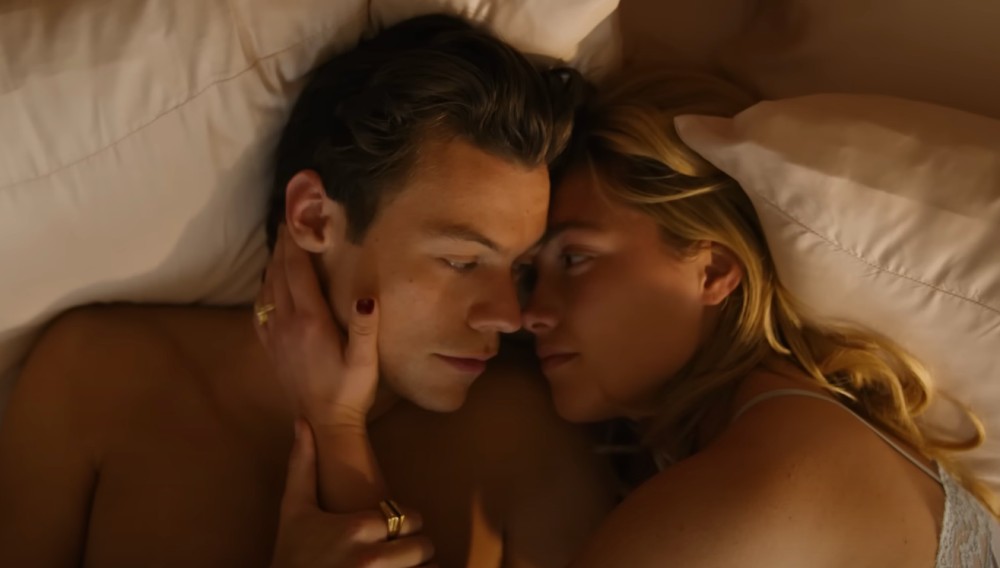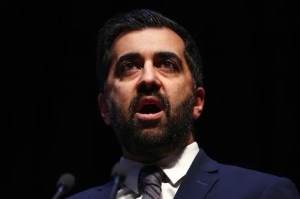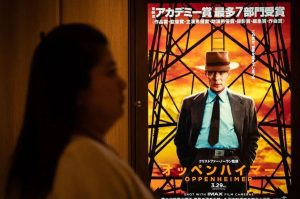Olivia Wilde’s Don’t Worry Darling is a film more likely to be remembered for its offscreen drama than its substance. If only the final product that made it onscreen was as spicy: here, a promising premise and intriguing themes are let down by languid pacing, scattershot performances, and a willingness to lapse into preachiness that borders on misandry.
Don’t Worry Darling is set in the planned community of “Victory” somewhere in the American West, a town led by self-help guru Frank (Chris Pine, playing a mixture of Joe Rogan, Jordan Peterson, and a televangelist — really, he wouldn’t be out of place on The Righteous Gemstones). The aesthetics of Victory are ambiguous — mostly 1950s-inspired atompunk, with more than a hint of BioShock influence — just like the town’s underlying purpose. Every morning, Victory’s women watch their husbands depart for their mysterious workplace — a strange facility atop a mesa overlooking the vast surrounding desert.
Among Victory’s residents are Alice (Florence Pugh) and her husband Jack (Harry Styles), contentedly living their best life until Alice realizes that all is not well in Victory. A series of strange accidents and disappearances, coupled with disturbing dreams, finally leads her to start investigating what’s going on. But, of course, Frank and his legion of red-uniformed security personnel have other ideas.
It will come as no surprise to anyone who’s seen her in Midsommar or Little Women that Pugh is great in the lead. Unfortunately, she’s let down by some sluggish writing and by her costar: Styles comes off as uninteresting and uncharismatic, a cardinal sin in a film that tries to foreground its romance. Wilde herself turns up as Alice’s neighbor Bunny, but she doesn’t leave much of an impression either. Rather, it’s Pine who has the most interesting material to work with here; he manages to be both charming and threatening without slipping into scenery-chewing villainy.
As the marketing campaign suggests, this is a movie that really hinges on its central mystery, and it’s better to enter with the twist unspoiled. A couple of points are worth noting, though.
Suffice it to say that, at its best, this is a film willing to daringly juxtapose two views of gender relations. On one side is the sort of Americana caricature that gave rise to second-wave feminism: a society led by ambitious but aloof men whose success comes at the expense of their homebound wives, left to while away the time day-drinking and wrestling with Betty Friedan’s “problem that has no name.” On the other is a late-modern, supposedly egalitarian vision that doesn’t feel any happier — a world of increasingly successful women and increasingly isolated men, struggling to make it in a demanding economy. The former imposes constraints on freedom through “thick norms,” or rigid social expectations, while the latter is marked by the alienation that comes from placing autonomy above all else.
For a few minutes in Don’t Worry Darling’s third act, the film seems to be suggesting that this is it — that men and women must choose one horn of the dilemma, with all its consequences. And that would be a bold move, one that wouldn’t map easily onto either side of the political spectrum. It would refuse any neat moralism. But alas, Don’t Worry Darling recoils from its own better instincts, lurching instead to a hackneyed conclusion that embraces standard progressive tropes. You’ll know it when you see it.
The core problem here is that, for all its lacerating exploration of what Charlotte Perkins Gilman memorably termed “yellow wallpaper” — pervasive oppression of women, leading to mental collapse — Don’t Worry Darling simply doesn’t have any interest in its male characters’ psychology. While it’s hard to say whether this is attributable to Styles’s limp performance or to lazy screenwriting, this film’s men are pretty much reducible to either abusers or incels. No nuance allowed.
Notably, Don’t Worry Darling managed to produce one of the most polarized reactions I’ve ever seen from a theater audience in real time. Exiting the theater, I overheard a young man muttering “that was impossibly bad” to his girlfriend. Judging by the clapping and cheering, though, most of the young women in the audience didn’t seem to think so. Welcome to 2022.


















